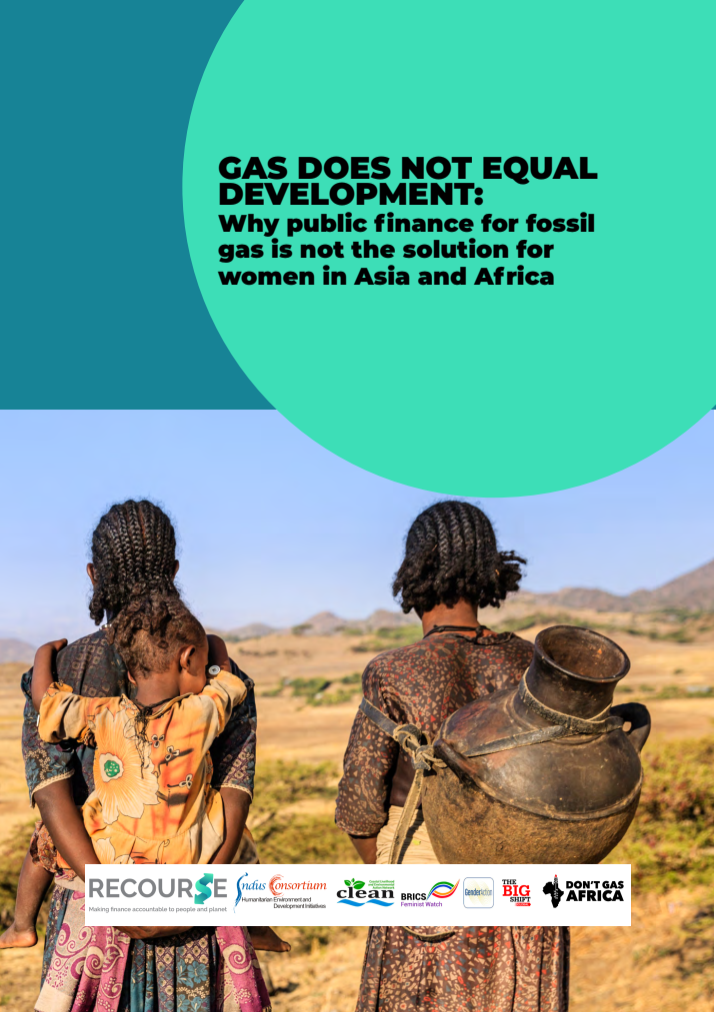- 10.10.2023
- Rights & Accountability
- Array
A new report by Coastal Livelihood and Environmental Action Network, Indus Consortium, BRICS Feminist Watch, Gender Action, Big Shift, Don’t Gas Africa, and Recourse finds that public funding of fossil gas harms the climate and worsens gender inequality.
The authors analysed public funding for fossil gas projects in Asia Pacific and Africa and found out that between 2016 to 2021, fossil gas projects received more public funding from MDBs and the G20 than renewable energy projects. According to Oil Change International’s monitoring of the G20’s and the MDBs finance on energy, Asia Pacific received around $17.65 billion in approved gas and oil and gas projects between 2016 and 2021. Approved clean energy projects in the region received only $15.19 billion. On the other hand, public finance for gas and oil and gas projects in Sub Saharan Africa and North Africa account for more than twice the amount invested in clean energy. From 2016 to 2021, approved gas and oil and gas projects received $55.04 billion while approved clean energy projects received only $21.89 billion. Fossil gas projects are also supported by public policy, including in multilateral development banks’ (MDB) policies and strategies on energy as well as the Joint MDB Methodological Principles for Assessment of Paris Agreement Alignment.
“The MDBs continue to support the climate crisis through public funding and policies that enable investments in fossil gas projects. This is harmful to both the planet and people, especially women and their communities. Climate change worsens existing gender inequalities. Rural women for example are reliant on agriculture but are landless. They must work harder in times of droughts and floods because the responsibility of securing water, food, and fuel for their families falls hardest on their shoulders. Lack of meaningful participation in decision-making makes it difficult for women to influence policy and decisions on energy, which in turn increases the burden of their work, as well as their vulnerability to climate change” says Marjorie Pamintuan, Finance Campaigner at Recourse.
Data compiled by Oil Change International also show that most fossil gas projects funded by the MDBs do not support energy access for communities living in poverty. Morever, the livelihoods and health of women living near the fossil gas infrastructures funded by MDBs in developing countries are also being negatively affected. Case stories from Senegal, Mozambique, Pakistan, and Bangladesh show that fossil gas projects funded by the AIIB, the IFC, and the World Bank have violated women’s rights. Landlessness, food insecurity, and health problems were experienced by women in communities near fossil gas projects.
“Women living near the AIIB-funded Unique Meghnaghat gas power plant, which is under construction, have suffered from noise pollution, allergies due to contaminated water and sand, and loss of access to land and water resources. Women could not grow vegetables and animals because the land was made sandy by the construction operations. They have to go far to fetch water for cleaning and cooking because they cannot access the river. This is an additional burden to domestic chores, especially during menstruation, when women need water for their hygiene,” says Sarmin Bristy, Research Officer at Coastal Livelihood and Environmental Action Network, Bangladesh.
“Engro’s fossil gas plant in Ghotki, Pakistan which was enabled by the IFC, did not bring access to energy to women living in communities near the facility. Communities have been suffering from long periods of black out. With no electricity, women are left with no option other than to collect firewood from far flung areas. Much worse, the women are suffering from health impacts of the air and water pollution from the fossil gas plant’s operation. Instead of supporting fossil gas, public finance should go to sustainable renewable energy projects that will help women and their communities meet their energy requirements,” says Izzah Batool, Research Associate at Indus Consortium.
Among the recommendations from the authors are:
- Stop public funding for fossil gas and extend the exclusion of support for coal to fossil gas in the MDBs’ individual policies/strategies and various lending instruments, including through financial intermediaries.
- Ensure transparency and full, prior public disclosure of all energy projects funded by the MDBs through financial intermediaries.
- Truly align MDBs’ investments to the goals of the Paris Agreement by including fossil gas investments in the list of universally non-aligned investments in the MDBs’ Paris alignment methodologies.
- Ensure meaningful, and gender-sensitive consultations to enable women to participate in decision-making about projects, including renewable energy projects, to be implemented in their communities.
- Channel MDBs’ investments towards sustainable renewable energy access for women and communities living in poverty.
- Address past harms and support the right to remedy and reparations of communities affected by fossil gas projects.
NOTES
Oil Change International is available found here.
Recourse are currently in Marrakech for the WB/IMF Annual Meetings. For further questions regarding this report or for interview/comment requests, please contact Marjorie Pamintuan : Whatsapp/Signal +639202759633.
